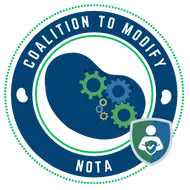
Let’s Pass the End Kidney Deaths Act.
“It’s long past time to modify the 1984 National Organ Transplant Act.”
- Al Roth, Nobel Laureate
Pioneer of Paired Donation

Incentivize organ donation through tax credits
The Coalition to Modify NOTA team proposes the passage of the End Kidney Deaths Act, a ten year pilot to provide a $50,000 refundable tax credit over five years to living kidney donors who give kidneys to strangers, those waiting the longest on the kidney waitlist. By the tenth year after the passage of the End Kidney Deaths Act, 60,000-100,000 Americans who were dying on the waitlist will instead have healthy kidneys, and we taxpayers will have saved an astronomical $14-25 billion.
Around 115 people are added to the kidney transplant wait list every day. Due to the long wait times on the kidney waitlist, each day 12 waitlisted Americans die and 21 are removed because they have become too sick to be transplanted. A total of 12,000 people are lost annually due to the kidney shortage.
Our Mission Statement
The Coalition to Modify NOTA is created in response to the inability of the current system to adequately address the crisis of kidney failure in the United States. The National Organ Transplant Act of 1984 prohibits the compensation of organ donors. The current system of deceased donations and voluntary living donation is grossly inadequate to the task of completely ending the shortage of transplant kidneys and saving the lives of patients in kidney failure who are dying unnecessarily each year.
The solution to this crisis is to have the government compensate donors in a manner that is neither exploitative nor coercive. The Coalition to Modify NOTA seeks the modification of the National Organ Transplant Act to allow such government compensation.
How badly is our transplantation system failing?
550,000 Americans Are On Dialysis
Living kidney donations last twice as long as deceased donor kidneys & are the gold standard of kidney care. Dialysis harms the body and often leads to depression.
Dialysis Costs Taxpayers $50+ Billion Annually
1% of our tax money is spent on kidney failure patients’ dialysis treatments. Once transplanted, an American can survive and thrive while taxpayers save money.
No Rise in Living Kidney Donation
In 24 years, the number of living donors has remained the same while the number of Americans on the kidney waitlist doubled.
The future of organ transplantation is full of possibilities, with high hopes for seeing xenotransplantation and artificial kidneys become a reality, but until that time the End Kidney Deaths Act will provide thousands more lifesaving kidneys.
12,000 die each year who were eligible for transplantation until the waiting time killed them.
Overview:
All non-directed kidney donors will be provided with a $50,000 refundable* tax credit allocated over five years.
*A refundable tax credit is a credit a taxpayer can get as a refund even if no tax is owed.
Rationale:
The current system of organ donation has not been able to adequately address the crisis of kidney failure in the United States. We can remove disincentives for donors so that more individuals become kidney donors, increase the supply of organs and save the lives of far more patients in need.
Cost-Effective Solution:
While there is an initial cost associated with removing disincentives for kidney donors, the long-term benefits far outweigh the expenses. By increasing the number of donor transplants, the need for costly dialysis treatments and other medical interventions can be reduced, resulting in substantial cost savings for the healthcare system in the long run. Medicare currently pays ~100k per year for each End-Stage-Renal-Disease patients.
Ethical Considerations:
The proposal for the removal of disincentives is not intended to exploit individuals but rather to recognize the value of their contribution and to address the current organ shortage. Safeguards are already in place to protect potential and living donors through the thorough physical and mental health screening process. Living donors are assigned a Independent Living Donor Advocate, protecting them from any undue influence or coercion.

The Coalition to Modify NOTA is Led By Non-Directed Kidney Donors
Former Colombia Professor and Executive Director of Waitlist Zero & NKDO mentor
Donated kidney to a stranger in 2020
Former Wall Street Executive, the Founder and Chairman of the National Kidney Donation Organization (NKDO)
Donated kidney to a stranger in 2015
Matt Harmody, MD
Retired ER physician, member of HRSA’s Division of Transplantation - Living Donor Steering Committee.
Donated kidney to a stranger in 2017
Former health care consultant, Director of Policy for NKDO, and current Strategy Manager for a Value-Based Care company
Donated kidney to a stranger in 2017







